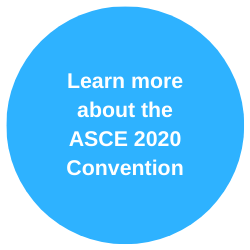It was a history-making week for ASCE with the Society’s first Virtual Technical Conference, Sept. 14-18.
The event, held entirely online, collected technical experts and speakers from different ASCE Institutes as well as the Aerospace Division.
“Great member value,” said ASCE President K.N. Gunalan, Ph.D., P.E., D.GE, F.ASCE. “Going forward we should be able to bring the best each Institute has to offer in this setting every year.”
The event, of course, came about because of the COVID-19 pandemic. With many Institute events canceled, it made sense to gather engineers from different disciplines for one technical conference. The resulting audience was an interesting mix of cross-industry perspectives.
 “V-Tech has made the best of an unfortunate situation that keeps us remote by affording us the opportunity to engage a significantly broader audience,” said Daniel R. Cook, P.E., S.E., M.ASCE, a senior project manager for Simpson Gumpertz & Heger in Boston, incoming president of ASCE’s Construction Institute and a session speaker at V-Tech.
“V-Tech has made the best of an unfortunate situation that keeps us remote by affording us the opportunity to engage a significantly broader audience,” said Daniel R. Cook, P.E., S.E., M.ASCE, a senior project manager for Simpson Gumpertz & Heger in Boston, incoming president of ASCE’s Construction Institute and a session speaker at V-Tech.
“It is extremely important that we take advantage of this. Before we were technical professionals, we were students. The fact remains, to be successful technical professionals, we must continue to be both students and teachers – constantly learning from our experiences and teaching those around us.
“That is especially true for situations such as the case study that I presented on the collapse of the Atlanta Botanical Gardens Walkway,” Cook said. “If we can help reduce the likelihood of similar construction accidents occurring in the future, even the slightest bit, by sharing our message with a broader audience, we have helped to make our industry and the world that much safer.”
Virtual conferencing. ASCE Welcome with @RobinKemperASCE and @gunalankn #vtech2020 “Institutes are the pillars of this great organization.” -Guna pic.twitter.com/uLDZ6jTUBB
— Alma Rettinger (@RettingerAlma) September 15, 2020
Tony Kulesa, P.E., ENV SP, M.ASCE, a senior structural engineer at Burns & McDonnell in Kansas City, especially enjoyed attending a V-Tech session about aerospace developments – not something he works on day to day.
“I did my master’s degree on composite materials supporting lunar construction,” Kulesa said. “So hearing an update on the status of the aerospace industry, ASCE’s Aerospace Division, and new research fronts is really exciting. I love to see how civil engineers are involved in furthering our opportunities on the moon’s surface and beyond.”
V-Tech certainly has proven that you never know where the multidiscipline connection points will show up; only that they will.
Meanwhile, the virtual format provided some benefits not possible in the traditional face-to-face environment.
 “Though the audience cannot be seen, if the discussion is engaging and intriguing enough, the audience can still enjoy it and interact during the session,” said Nalah Williams, a project designer for the Core States Group in Dallas, and moderator of a Construction Institute panel discussion about diversity and inclusion.
“Though the audience cannot be seen, if the discussion is engaging and intriguing enough, the audience can still enjoy it and interact during the session,” said Nalah Williams, a project designer for the Core States Group in Dallas, and moderator of a Construction Institute panel discussion about diversity and inclusion.
The virtual menu afforded the flexibility, Kulesa said, to take a work call and jump right back into a V-Tech session. Or as Gunalan noted, the ability to watch sessions on-demand meant no more missing out on interesting sessions happening at the same time.
“While speaking at a virtual event can never truly live up to the face-to-face time afforded before, during and after in-person presentations, speaking at V-Tech was a significantly better experience than other webinars I have delivered in the past,” Cook said. “Being on camera with a moderator, coupled with the live polling and chat functions, brought what can normally be a blind lecture to the next level. It allowed me to get to know my audience and see that they were engaged from start to finish.”


